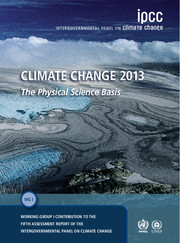 Climate Change 2013 – The Physical Science Basis
Climate Change 2013 – The Physical Science Basis Published online by Cambridge University Press: 05 June 2014
Executive Summary
This chapter assesses the scientific literature on projected changes in major climate phenomena and more specifically their relevance for future change in regional climates, contingent on global mean temperatures continue to rise.
Regional climates are the complex result of processes that vary strongly with location and so respond differently to changes in global-scale influences. The following large-scale climate phenomena are increasingly well simulated by climate models and so provide a scientific basis for understanding and developing credibility in future regional climate change. A phenomenon is considered relevant to regional climate change if there is confidence that it has influence on the regional climate and there is confidence that the phenomenon will change, particularly under the Representative Concentration Pathway 4.5 (RCP4.5) or higher end scenarios. {Table 14.3}
Monsoon Systems
There is growing evidence of improved skill of climate models in reproducing climatological features of the global monsoon. Taken together with identified model agreement on future changes, the global monsoon, aggregated over all monsoon systems, is likely to strengthen in the 21st century with increases in its area and intensity, while the monsoon circulation weakens. Monsoon onset dates are likely to become earlier or not to change much and monsoon retreat dates are likely to delay, resulting in lengthening of the monsoon season in many regions.
To save this book to your Kindle, first ensure no-reply@cambridge.org is added to your Approved Personal Document E-mail List under your Personal Document Settings on the Manage Your Content and Devices page of your Amazon account. Then enter the ‘name’ part of your Kindle email address below. Find out more about saving to your Kindle.
Note you can select to save to either the @free.kindle.com or @kindle.com variations. ‘@free.kindle.com’ emails are free but can only be saved to your device when it is connected to wi-fi. ‘@kindle.com’ emails can be delivered even when you are not connected to wi-fi, but note that service fees apply.
Find out more about the Kindle Personal Document Service.
To save content items to your account, please confirm that you agree to abide by our usage policies. If this is the first time you use this feature, you will be asked to authorise Cambridge Core to connect with your account. Find out more about saving content to Dropbox.
To save content items to your account, please confirm that you agree to abide by our usage policies. If this is the first time you use this feature, you will be asked to authorise Cambridge Core to connect with your account. Find out more about saving content to Google Drive.